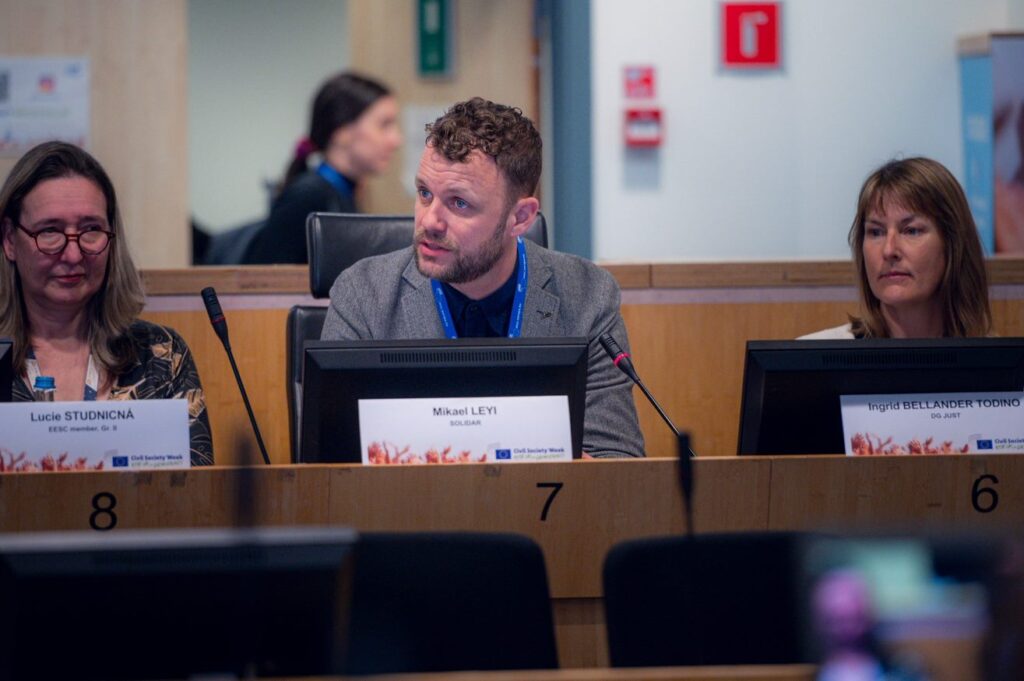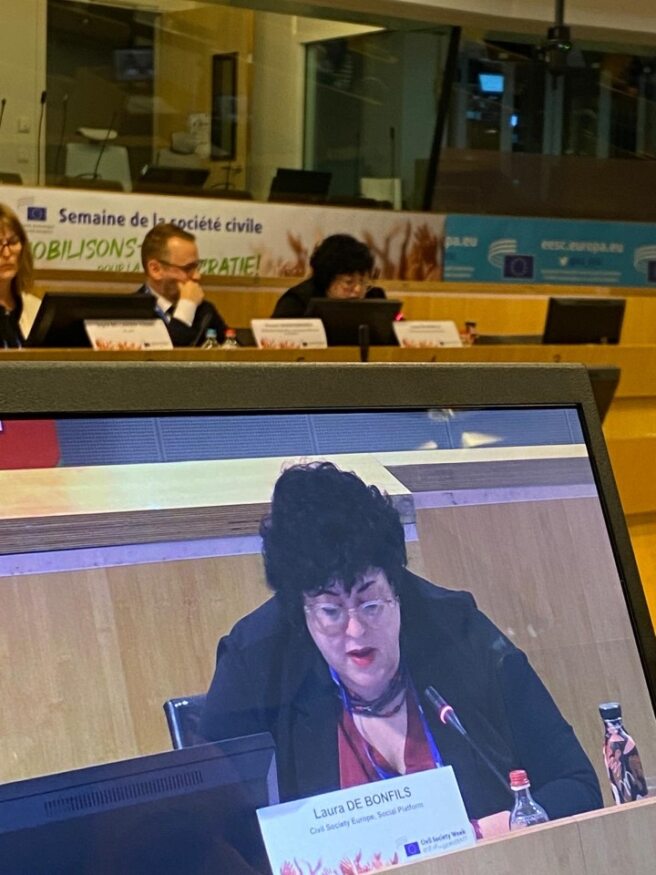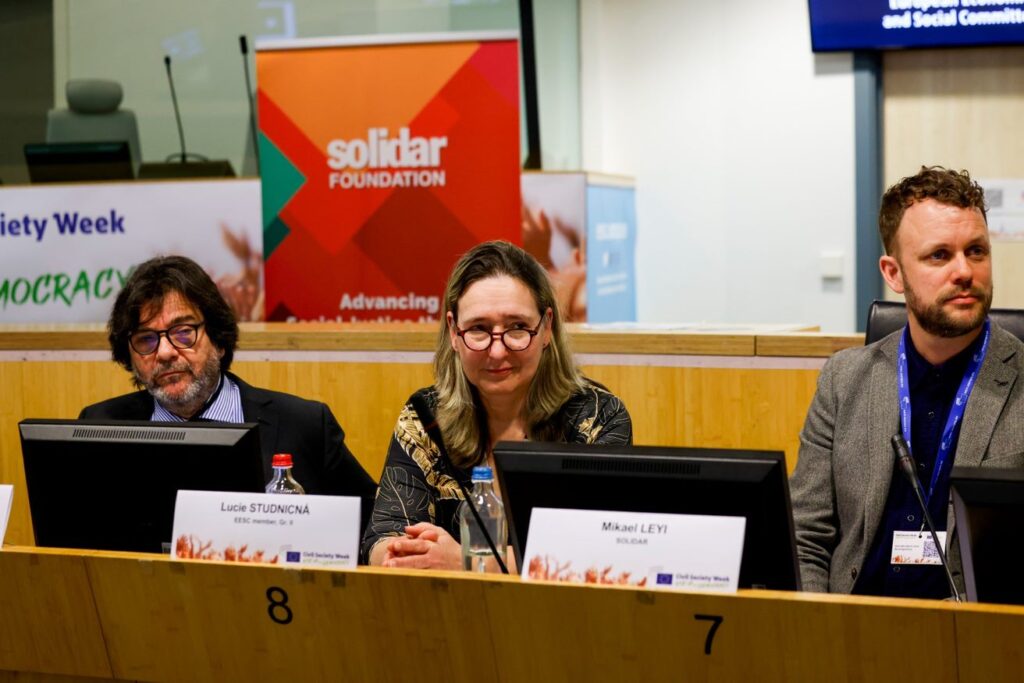SOLIDAR to the EESC to reiterate the role of civil dialogue for inclusive democracy – civil society week ’24
SOLIDAR and its partners Social Platform, Civil Society Europe and the European Civic Forum organised a workshop in the framework of the EESC Civil Society Week on 6th March. The workshop, titled “Civil dialogue for inclusive democracy”, was dedicated to highlighting the potential of civil dialogue for the health of our democracies and to reflect on ways to fully materialize this potential, which is also enshrined in the Treaties of the European Union (Art. 11 TEU).
The two-hour long session was moderated by Mikael Leyi, SOLIDAR’s Secretary General, who highlighted the timely nature of the exchange, which came a few weeks after the adoption of the EESC opinion on civil dialogue, released following the Belgian Presidency’s request. He also noticed that structured civil dialogue is needed by both CSOs and institutions, as these last need to be able to identify the representative actors from civil society.
Alexandrina Najmowicz, Secretary General of the European Civic Forum and Board member of Civil Society Europe, gave some opening remarks, in which she underlined that the political disengagement that we are witnessing in Europe is the result of the lack of ability of decision-makers to respond to their real needs. In addition, the increase in the repression of contestation is eroding the dialogue between civil society and the authorities, weakening democracy and exacerbating social injustice.
“There is no better way to defend democracy than to enact it”, Alexandrina Najmowicz
Colette Solomon, from the South African organisation Women on Farm Project presented a case-study from the national context. She described how her grassroot organisation connected multiple stakeholders, primarily women farmers and dwellers from marginalised communities, as well as trade unions and other CSOs, to call for a ban on pesticides that are already prohibited in the EU, but that are nonetheless sold by EU countries to South Africa. This advocacy campaign was successful and obtained the ban of such products. In this case study, Colette Solomon exemplified the power of civil society to protect the rights of the most marginalised and foster democracy, a concrete proof of the need for an enabling space of civil society organisations and the creation of structural dialogue between CSOs and the decision-makers.
Following this first national case study a panel discussion took place. Here representatives from the EESC ( Pietro Barbieri, Vice-President of EESC Civil Society Organisations’ Group, rapporteur of the opinion “Strengthening civil dialogue and participatory democracy in the EU: a path forward” and Lucie Studnicna, President of EESC Workers’ Group), civil society (Laura de Bonfils, Board member of Civil Society Europe and Secretary General of Social Platform), the European Commission (Ingrid Bellander Todino, Head of Unit Fundamental rights policy in DG JUST ) and the Belgian Presidency of the Council of the EU (Vincent Vandersmissen, Attaché at the Belgian Ministry of Foreign Affairs, in the Directorate-General European Affairs and Coordination) got together to discuss.



Pietro Barbieri retraced the process that led to the adoption of the EESC opinion on civil dialogue, mentioning some of the obstacles encountered, which included the definition of civil society and the need to ensure that civil dialogue does not overlap with social dialogue. Lucie Studnicna underlined the priceless role of civil society in protecting the most vulnerable and defined civil dialogue as the backbone of our democracies. Furthermore, she stressed that it is important to clearly define social and civil dialogue as the two are not in competition. Laura de Bonfils called for a more structured civil dialogue in the EU. She highlighted that this can be achieved through the introduction of an EU interinstitutional agreement on civil dialogue and of a civil society strategy based on an enabling environment for CSOs, a protection mechanism for CSOs and human rights defenders and access to funding. She also provided examples of good practices for improving the transparency and accessibility of civil dialogue for CSOs, such as providing timely and clear information on how to engage in civil dialogue, beyond mere ad-hoc consultations. Ingrid Bellander Todino recognised that civil dialogue in the EU is present to a certain extent but that more should be done to build a comprehensive structure. She reiterated that social and civil dialogue are not mutually exclusive. Vincent Vandersmissen explained that the Belgian Presidency requested an opinion on civil dialogue with the intention of advancing on the definition of civil society as well, which is crucial to avoid its delegitimization.
The Q&A session that followed the discussion focused on the need to capitalise on the current Belgian Presidency to advance the civil dialogue agenda. The Defence of Democracy Package was mentioned as a key file, that despite its criticalities should not be discredited according to Vincent Vandersmissen. Ingrid Bellander Todino specified that no new initiatives are foreseen at the end of this mandate, but that support to CSOs will still be given through funding.
Finally, Tina Divjak from the CSO CNVOS, presented another case study on Slovenian civil dialogue. In particular, she outlined how civil dialogue works in her country, introducing the role of consultative bodies in which CSOs are also represented, which support in the policy making process on several issues.
In the closing remarks, Gabriella Civico, President of Civil Society Europe, recapped the salient points of the debate and concluded that bolder action is necessary to strengthen civil dialogue across Europe.
The key messages emerged from the workshops held in the framework of the Civil Society Week will feed into the EESC recommendations for the next EU mandate.
Our key messages from the workshop are:
- Civil dialogue is the backbone of representative democracy and is essential to amplify the voice of the most vulnerable groups in our society and to give concrete responses to the diverse needs of the people in Europe. More institutional recognition, support and involvement of organised civil society is needed for it to fulfill its full potential and for Art 11 TEU to finally become a reality.
- Civil dialogue does not mean having a third social partner to engage in social dialogue, but to have a parallel, equally important and structured process for representing the diversity of civil society in Europe contributing towards more fit for purpose public policies that leave no-one behind. The two processes are not mutually exclusive but rather mutually reinforcing.
- There is momentum for progressing on the institutionalization of civil dialogue and this must be seized in the next EU mandate, it is high time for this. Concrete action like a Civil society strategy based on an enabling civic space, a mechanism to protect civil society, activists and defenders and adequate funding, as well as an EU Interinstitutional agreement are the steps forward.


